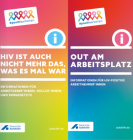Counselling for discrimination in the work context

The majority of people with HIV in Germany are gainfully employed. People with HIV are not banned from working; they can pursue any profession. Nevertheless, there is still discrimination, prejudice and unnecessary fear of infection.

The flyer from the #positivarbeiten project is aimed at people with HIV and employers. It can be ordered free of charge at aidshilfe.de/shop.
Asking about HIV status or an HIV test during recruitment examinations is not permitted in most cases. Employers may only ask about health restrictions that relate to the intended job. For the vast majority of jobs, HIV does not play a role, so a question about HIV status does not have to be answered truthfully.
If an employee is dismissed due to HIV infection, this may constitute discrimination under the General Equal Treatment Act (AGG). Quick counselling and legal support is important in such a case in order not to miss any deadlines.
Advice and support can be obtained from the German AIDS Service Organisation's (DAH) contact point, local AIDS service organisations and anti-discrimination agencies (website only available in German).
- Free choice of profession
People with HIV can practise any profession; there is no risk of infection in everyday working life. This also applies to medical or dental facilities, in care and nursing, in the catering and food industry and in the care of children, young people and others. The usual hygiene and occupational safety measures offer reliable protection.
There are only requirements for surgeons who carry out particularly high-risk activities. According to the recommendation, the viral load of people with HIV should be below the detection limit of 50 viral copies per ml and double gloves should be worn.
According to Section 43 of the Infection Protection Act, every person employed in catering or food processing requires a certificate from the public health department. This does not require an examination, but only participation in an "instruction". The health authorities offer appointments for this. People with HIV can obtain this certificate without any problems - an HIV test is not required.
If the job involves travelling to countries where there are entry restrictions for people with HIV, employees should find a solution together with their employer.
- No questions about HIV and no HIV test
All employees have a right to the protection of their privacy. This also includes personal health information. The question of HIV infection may only be asked if it is relevant to the job being performed. This is not the case in almost any profession, the only exception being surgical activities that are particularly prone to injury. Employees even have a "right to lie": they are allowed to answer questions untruthfully that employers are not allowed to ask because they are not relevant to the job.
An HIV test is not part of the pre-employment medical examination or occupational health screening. It is sometimes claimed that a (negative) HIV test is necessary for certain areas of work, for example in nursing, care of the elderly, children and young people or in laboratory work. However, this is not correct. As HIV cannot be transmitted in everyday working life, even "voluntary" HIV tests have no place here - such a test can never be voluntary in the context of an employment relationship.
Company doctors are also not allowed to pass on diagnoses to employers. They are only allowed to state whether employees are suitable for their work or not. If you do not comply with this, it is a breach of data protection or even the duty of confidentiality.
Incidentally, employment agencies and job centres are also not allowed to inform potential employers about the HIV infection of jobseekers.
- What can you do if discrimination occurs?
Good first points of contact are the local Aids service organisations (Aidshilfen). We can also advise you on this at the contact point for HIV-related discrimination. We will then consider together what sensible steps to take and to whom any complaints should be addressed.
If you have been discriminated against at work, you can take legal action. According to the AGG, you are not entitled to recruitment, further training or promotion, but you may be entitled to damages or financial compensation. Counselling is also useful for this.
If employers become aware of discrimination, they are obliged to protect affected employees from further discrimination and to take appropriate measures to eliminate discrimination, for example by issuing warnings, transferring or dismissing discriminating persons and making structural changes.
Under the General Equal Treatment Act, employers are even obliged to set up a complaints office for employees.
- What can employee representatives do?
Labour unionists, works or staff councils, equal opportunities officers or representatives for the severely disabled can be important points of contact for people with HIV when it comes to addressing discrimination in the workplace. As they have a duty of confidentiality towards employers and other employees, they can offer those seeking advice a safe space.
Employee representatives can also campaign for employers to sign the declaration "Respect and a matter of course: For a non-discriminatory approach to HIV-positive people in working life” (website only available in German) (Declaration #positivarbeiten).
- What can employers do?
Employers can promote a respectful climate that benefits everyone. They can educate, signal openness and take a stand against discrimination.
Employers can also
- sign the #workingpositively declaration (website only available in German and bring the principles contained therein to life
- obtain information about HIV and provide information material, for example free of charge in the DAH shop
- Offer training and further education
- develop guidelines and company agreements that take into account the needs of people with chronic illnesses, such as flexible working hours.
- Openly HIV-positive at work
Coming out as HIV-positive at work can be relieving. A "positive coming out" can give you self-confidence and allow you to experience being accepted for who you are. It can also be relaxing to no longer be afraid of something "slipping out" when it comes to personal issues.
However, the reactions and attitudes of others can only be influenced to a limited extent. They are often better than expected. Nevertheless, negative reactions are also possible.
Not all people with HIV can or want to be open about their infection at work. Only people with HIV decide for themselves whether, when, with whom and how they talk about it.
Many people who want to be open about their HIV infection take a step-by-step approach. They first create a safe place for themselves, for example in a relationship, friendship or family. They then go on to spread the word further and further. In doing so, they draw on positive reactions from their first coming-out experiences.
Anyone thinking about coming out at work can benefit from the experience and knowledge of many others. Self-help organisations and groups offer support and practical advice. A list of self-help contacts can be found here.
GOOD TO KNOW
- HIV tests must not be requested during recruitment examinations - there are very few exceptions to this rule.
- Nobody has to tell employers and colleagues about an HIV infection.
- HIV is not transmissible in everyday interactions, not even at work. There is no risk of transmission for superiors, colleagues, customers or people in care.
- Being open about HIV can be a relief.
More about the topic
- Detailed information for employers can be found in the brochure "HIV und Arbeit? Das geht!” (broshure only available in German)
- A compact fact sheet on HIV and work in PDF format can be found here. (flyer only available in German)
- The double flyer "Out am Arbeitsplatz"/"HIV ist auch nicht mehr das, was es mal war" with information for HIV-positive employees/for employers, colleagues and superiors can be ordered free of charge from the DAH shop. (flyer only available in German)
